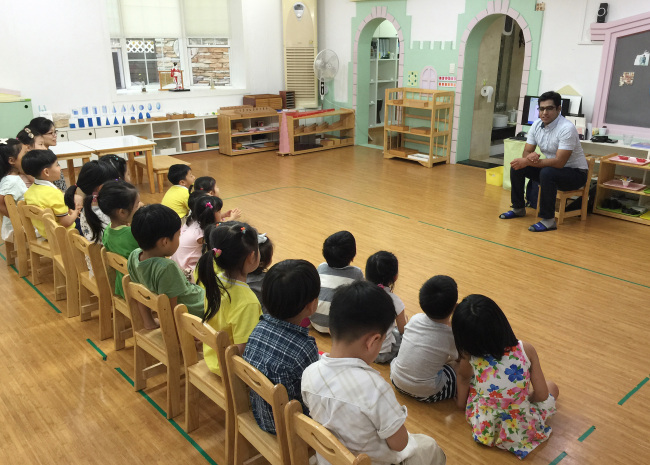Moroccan student Amine Ammor regularly visits Korean schools once a week.
Every time he explains the exotic Moroccan culture to teenage students, he sees the eyes of the students beaming with anticipation and curiosity.
“At the end of the class, students give me sweet notes saying that they wish to visit Morocco someday or that they want study English better,” said the 25-year-old.
Studying computer science and film at a Korean university, Ammor initially started his volunteering to raise the understanding of his country. Describing how Morocco embraces a mix of Arabic, African and European cultures, he is now putting efforts to encourage youngsters to get more exposure to foreign cultures and interact with expats.
“I can see that those exposed to diverse cultures at an early age are more open-minded and active in interacting with foreigners. I hope to continue my volunteering as long as I stay here,” he said, adding that he plans to go to a Korean graduate school next year.
Ammor is one of the 43 foreigner teachers who participate in Seoul City’s public multicultural class program called Neighbors from Afar. The program aims to raise cultural understanding through visits by foreign volunteers to school classrooms to offer glimpses of their countries and cultures.
 |
| A Pakistani volunteer lectures a class about his country’s culture at a kindergarten as part of the “Neighbor from afar” program in central Seoul. Yonhap |
Launched in 2008 with about 1,100 teenage students, the program now teaches over 56,000 students in the city, showing about a fiftyfold increase.
As of last year, a total of more than 166,000 Korean teenagers have attended the program since its inception, and the number attending this year has already exceeded 80 percent of last year’s figure, the city said.
The hands-on classes and active role of foreign instructors contributed to the rapid growth of the program, officials said.
To better stimulate the students’ interests, teachers started to offer participatory classes such as trying on traditional outfits and playing traditional instruments in addition to using visualized materials.
The city also diversified the cultures discussed to relatively lesser-known countries such as Slovakia, Congo, Ethiopia and Krygyzstan.
“Some elementary school students sometimes feel awkward when a foreign teacher visits them. But they soon get used to it. Their perception toward people of different races and nationalities seems to have changed after the classes thanks to the passionate teachers,” the city said.
Buoyed by the fruitful outcome, Seoul City expanded the program this year to schools for disabled children and youth training centers to widen the learning opportunities to more students.
It also started to offer special talking classes led by foreign public figures and celebrities.
The city is considering to expand the “Neighbors from afar” with the cooperation of the Seoul Metropolitan Office of Education and Seoul district offices, the authorities said.
Anyone interested in taking the multicultural class can register online at global.seoul.go.kr.
By Lee Hyun-jeong (rene@heraldcorp.com)

